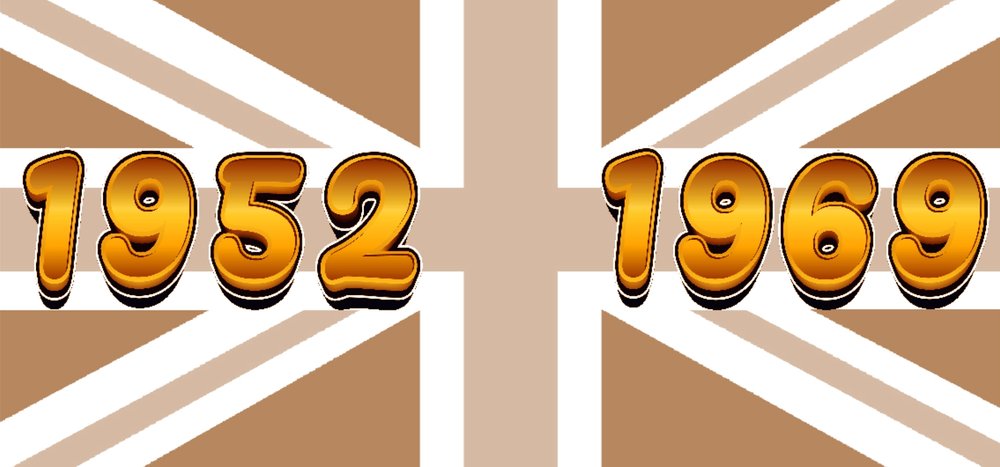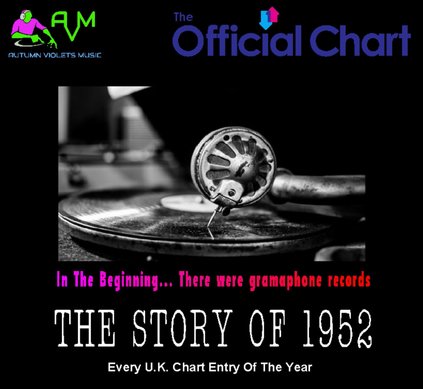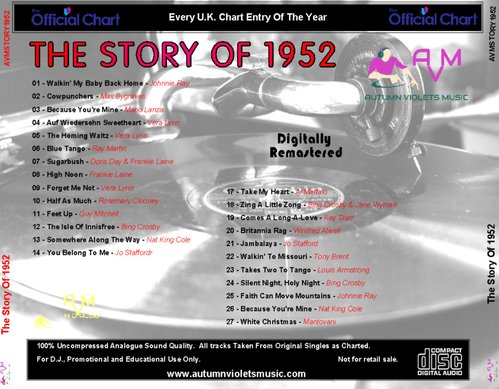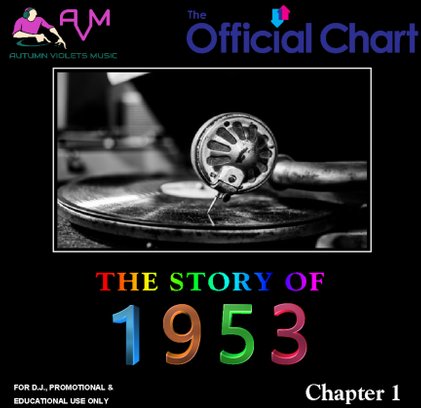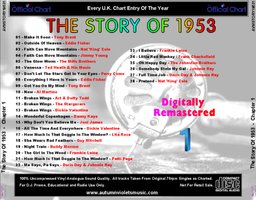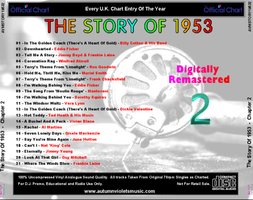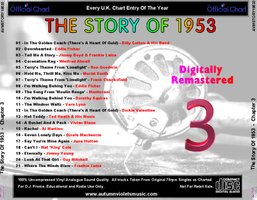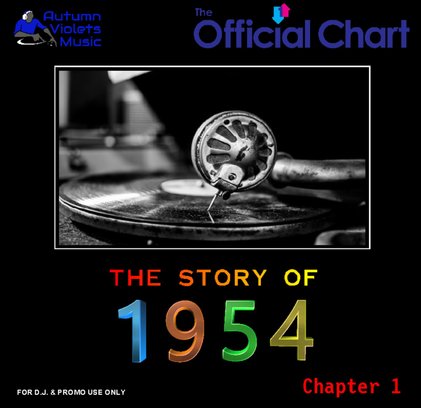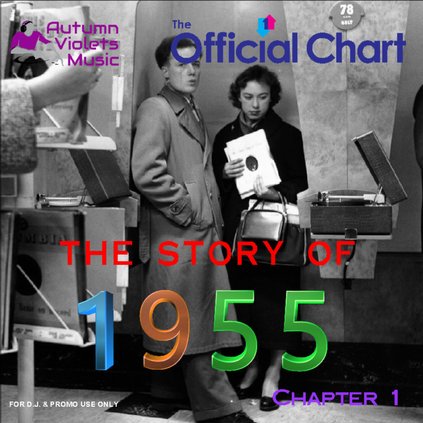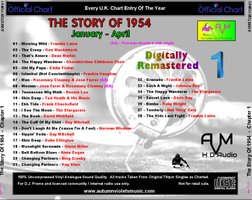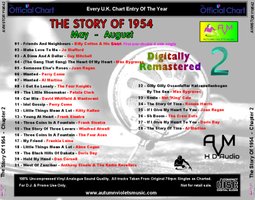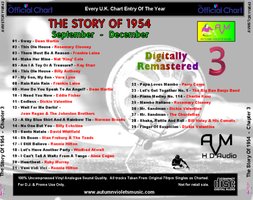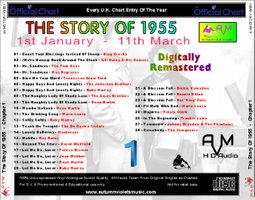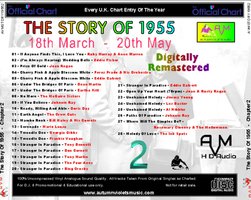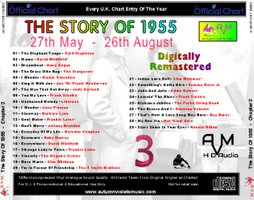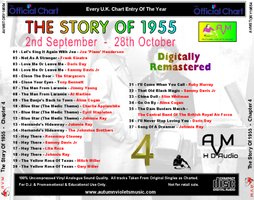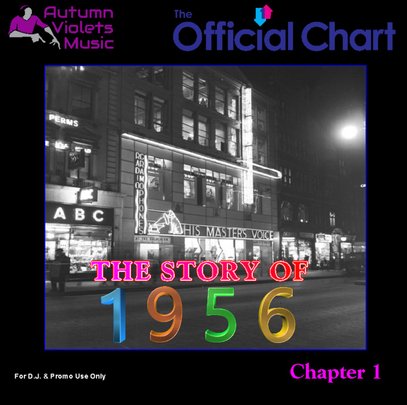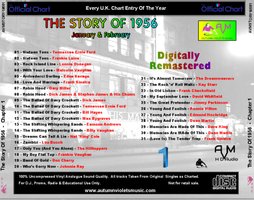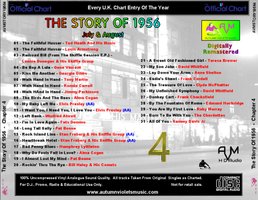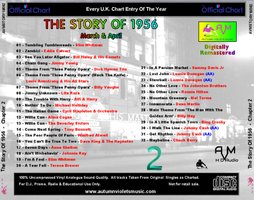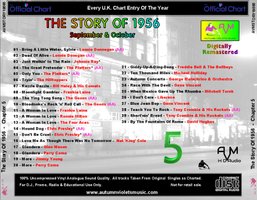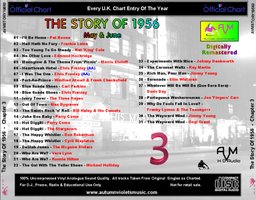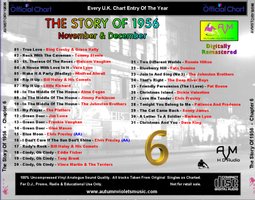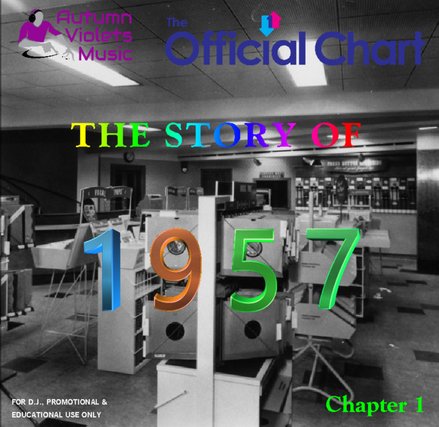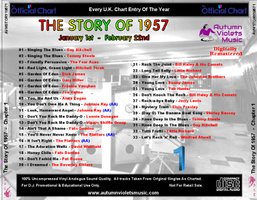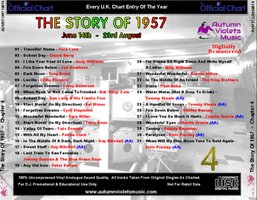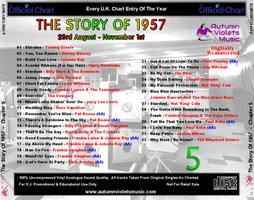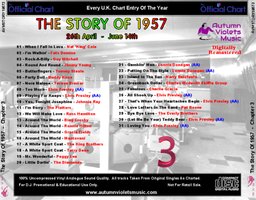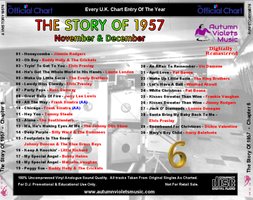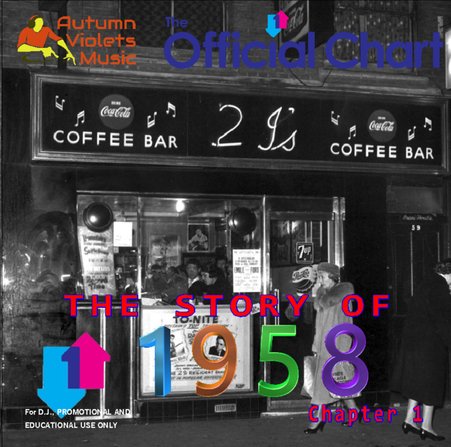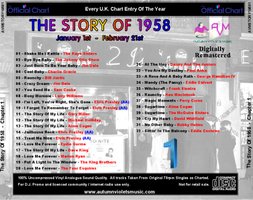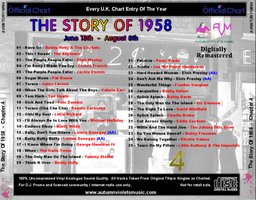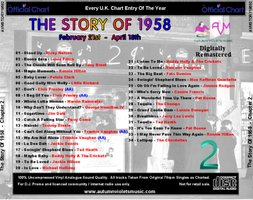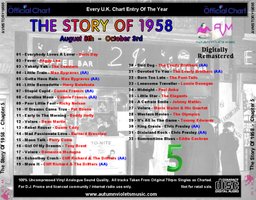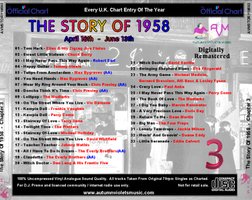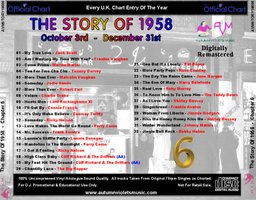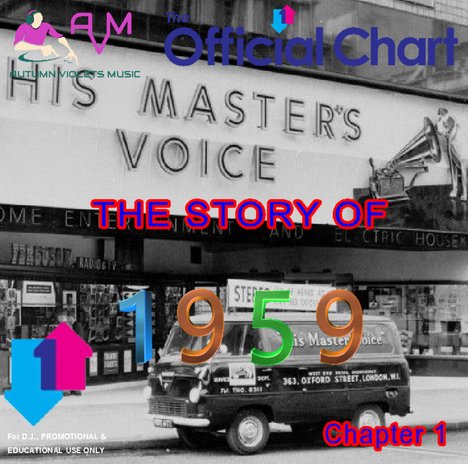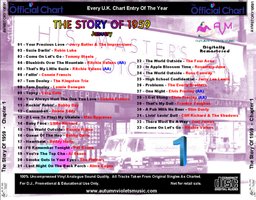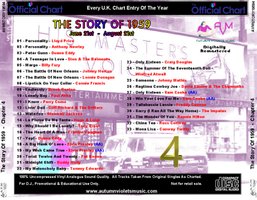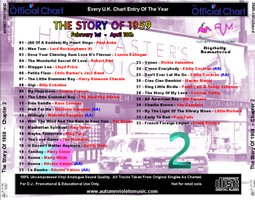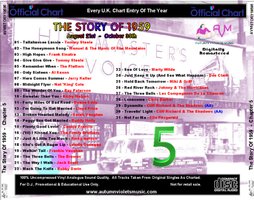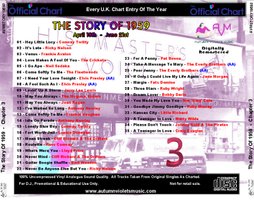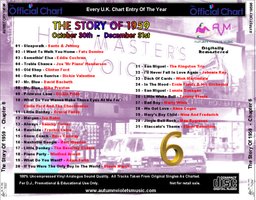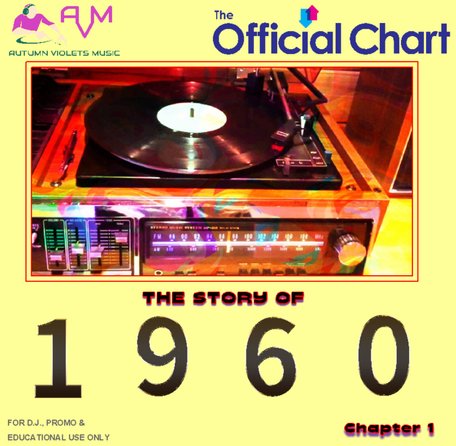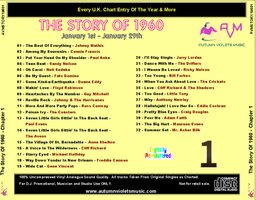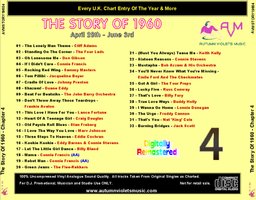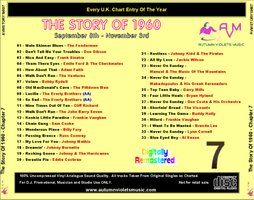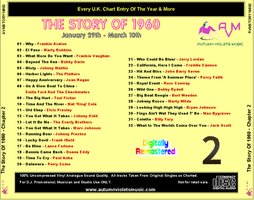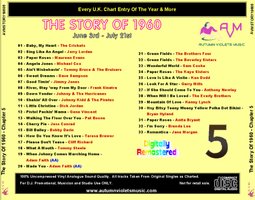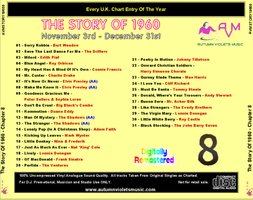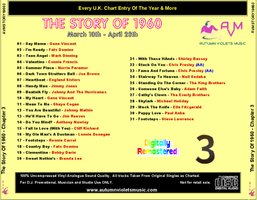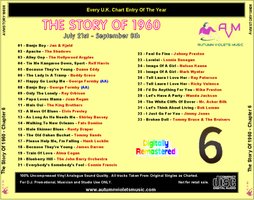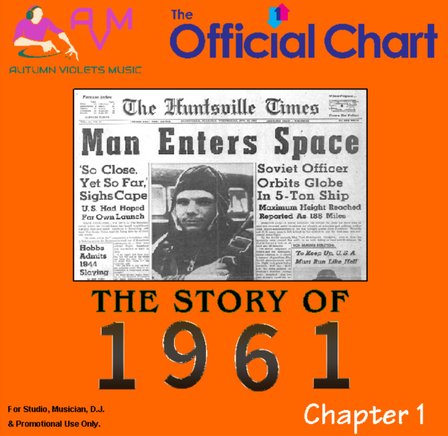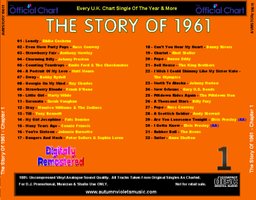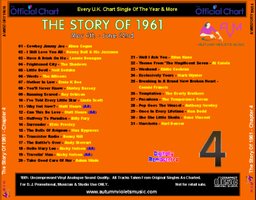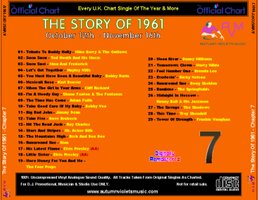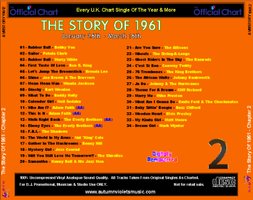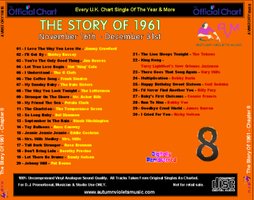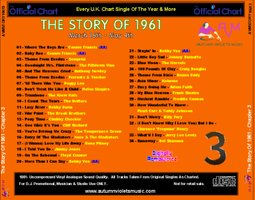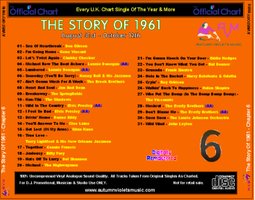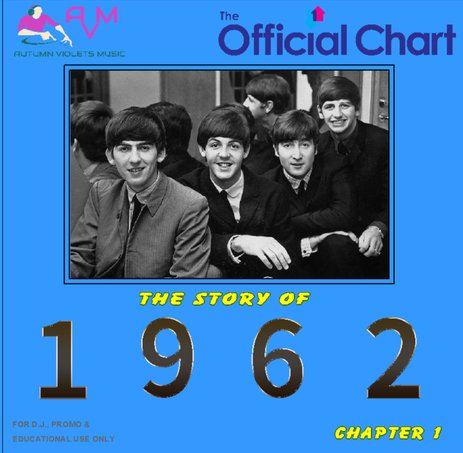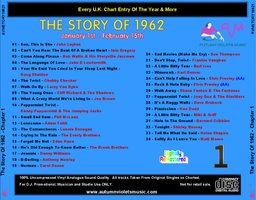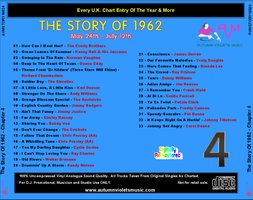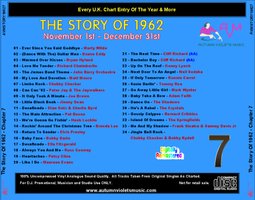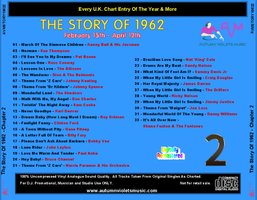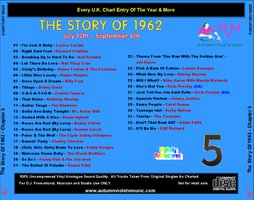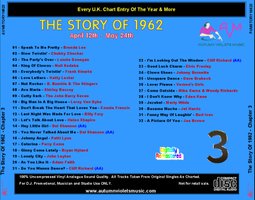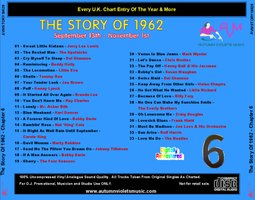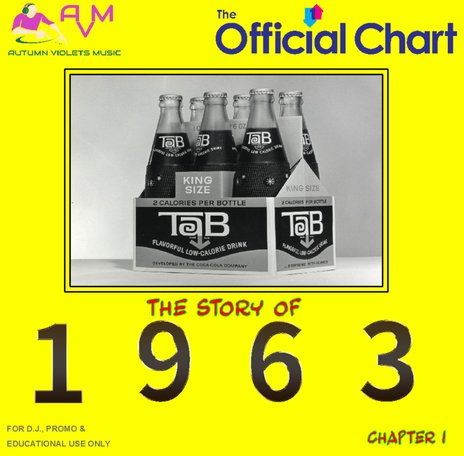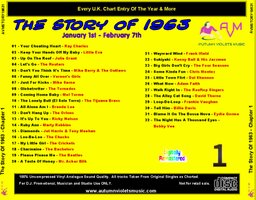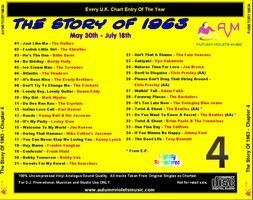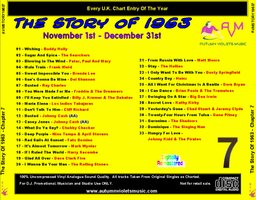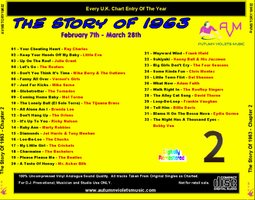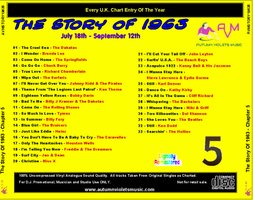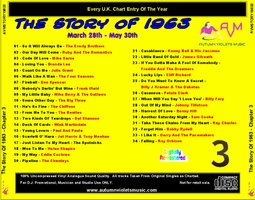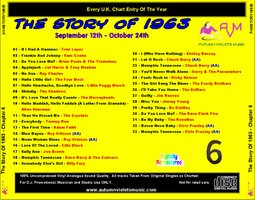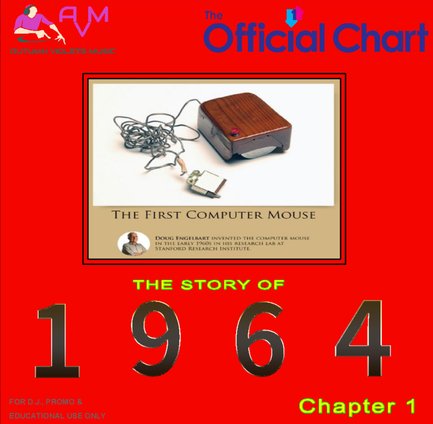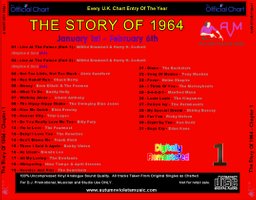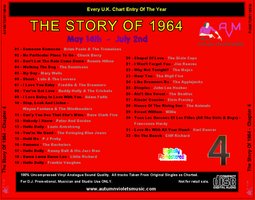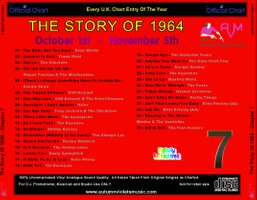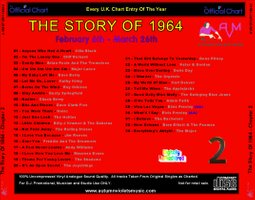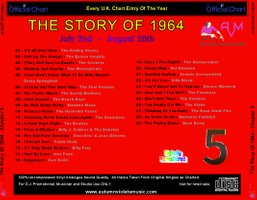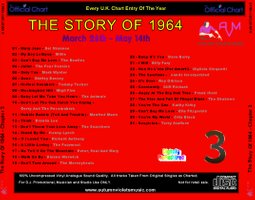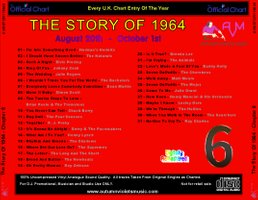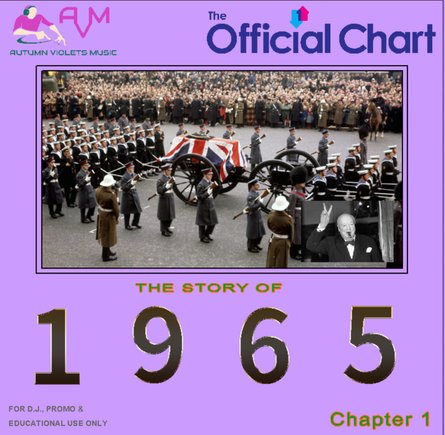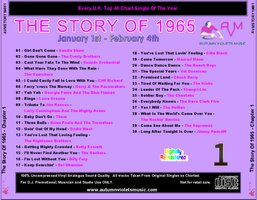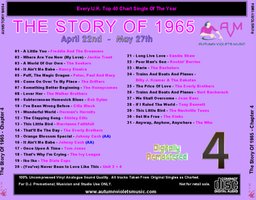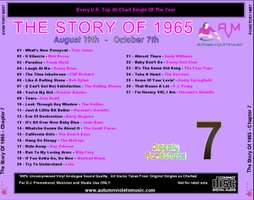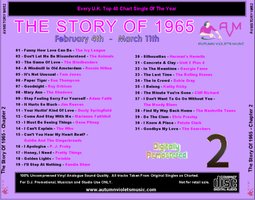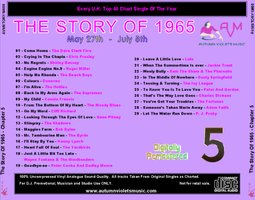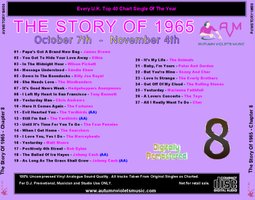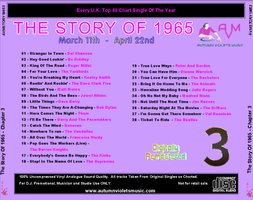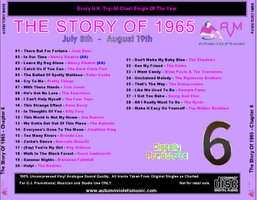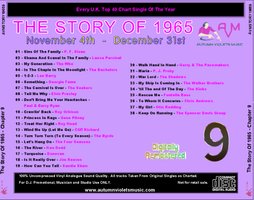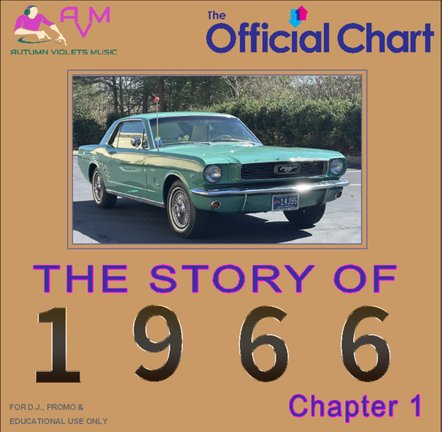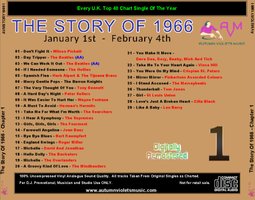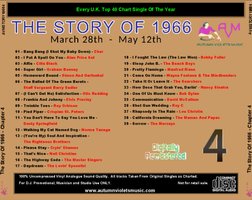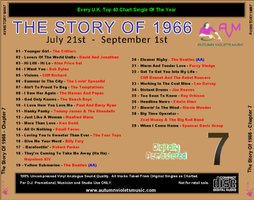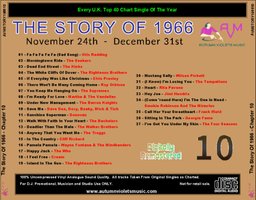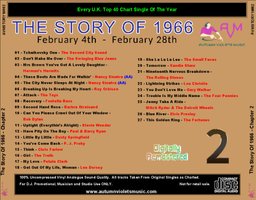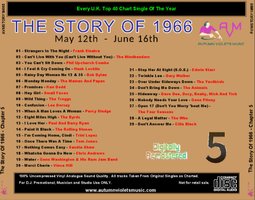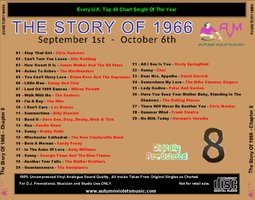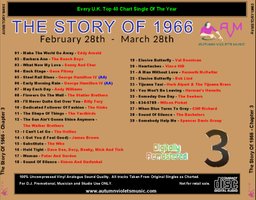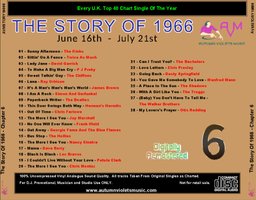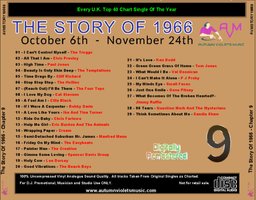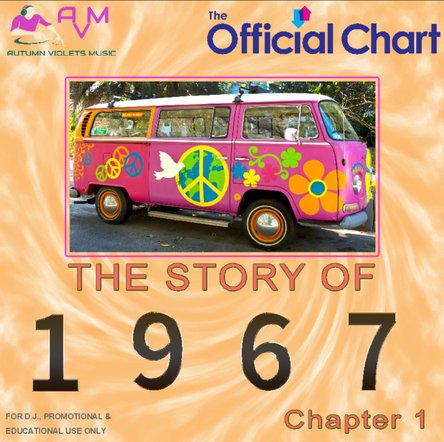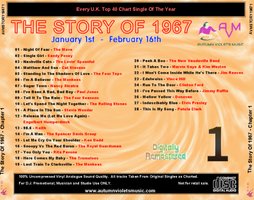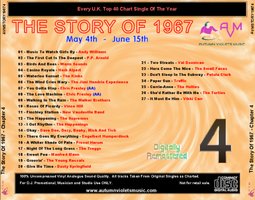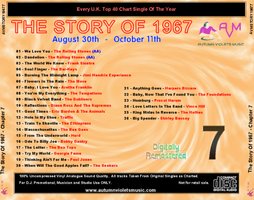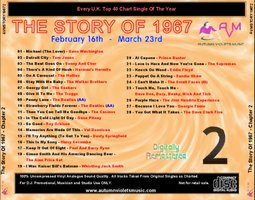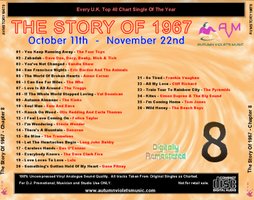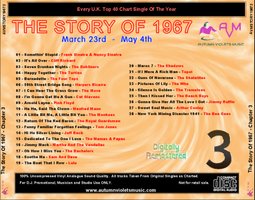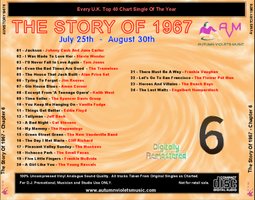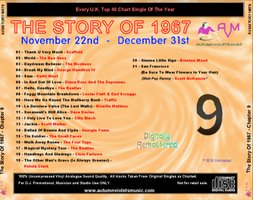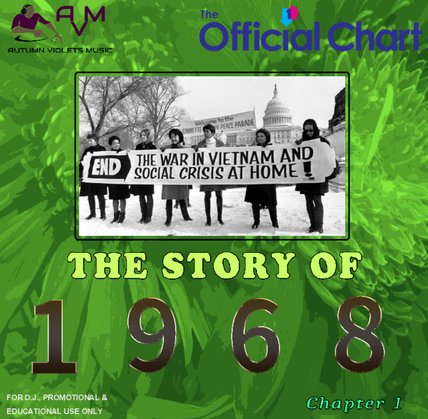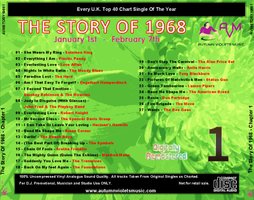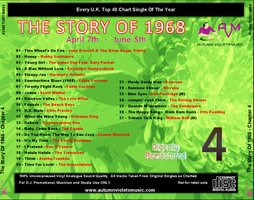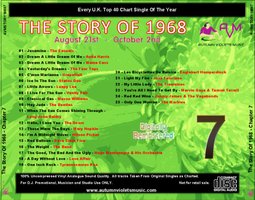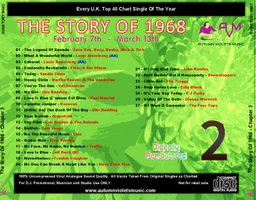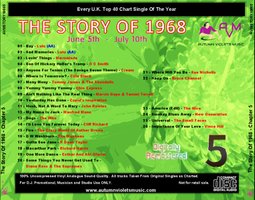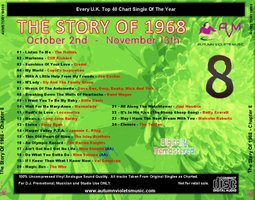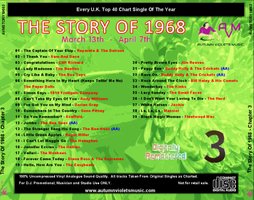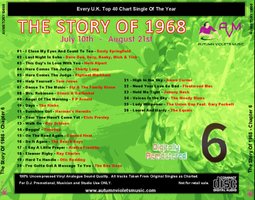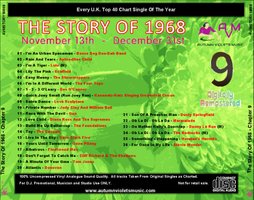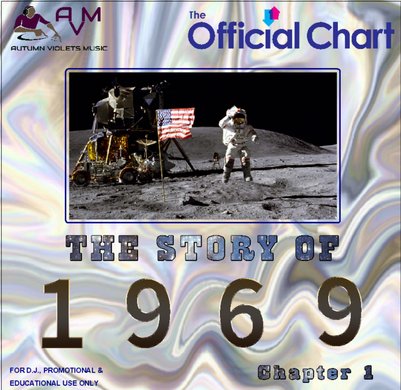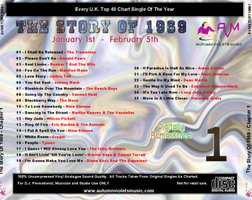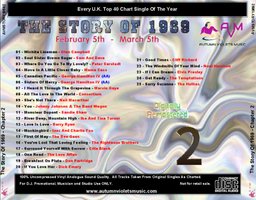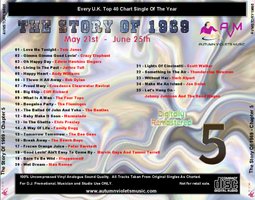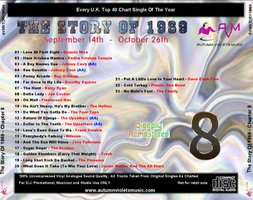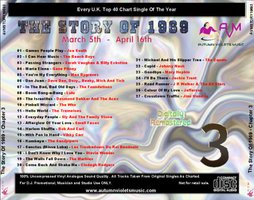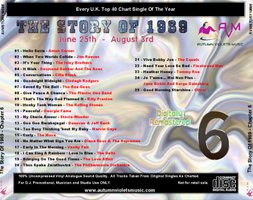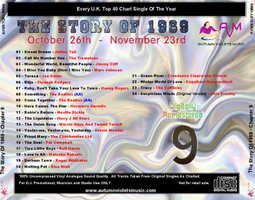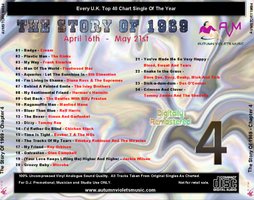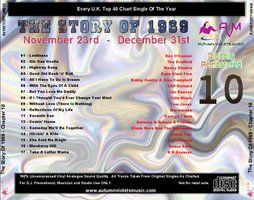ALL MUSIC LISTED ON THIS PAGE THAT WAS NEVER RELEASED IN STEREO (Only Mono), HAS BEEN RECHANNELLED AND REMASTERED IN TRUE 8 TRACK HI-FI STEREO USING STATE OF THE ART RECORDING STUDIO UTENSILS AND SOFTWARE TO BRING YOU THE HI-FI STEREO SOUND WE THINK IT WOULD HAVE SOUNDED LIKE IF IT WAS RELEASED IN STEREO TO BEGIN WITH. NOTHING HAS BEEN ADDED IN THE REMIXING TO KEEP TO THE ORIGINAL RECORDING AS THE ARTIST INTENDED YOU TO HEAR IT.
For Best Results view this page on a desk top or laptop computer
(Mobile viewing may not be in order)
Click on CD covers to enlarge and read track listings
1955 – The show destined to become the UK’s first radio broadcast chart show, Pick Of The Pops, is launched on the BBC’s Light Programme. Initially not featuring any charts, host Alan Freeman begins referring to the Top 10s published by the various music papers, Melody Maker, NME, Disc, and Record Mirror two years later in 1957. An average Top 10 is introduced in 1958. It was the 'New Musical Express' (NME) chart used on this website and this was/is the chart of the time currently recognized by the 'Official Charts Company' and the B.B.C.
The first single destined to become a UK million-seller was Billy Haley & His Comets with 'Rock Around the Clock'. It goes on to become a Top 20 smash on five separate occasions - twice in 1955, plus in 1956, 1968, and 1974. To this day it still appears in the top 100 from time to time.
By summer 1955 Rock 'n' Roll was already in full swing in the U.S.A. Although 'Elvis' was still recording 'Rockabilly' with 'Sun' Records and still internationally unknown until the following year. It was the said single above that sparked it all in the U.K. Starting as a throwaway flip side to 'Thirteen Woman (And Only One Man In Town)' 'Rock Around The Clock' after being played constantly by 'Glenn Ford's son in his room was to feature in the credits of the movie 'Blackboard Jungle' in which Ford starred.
And the rest as they say is history.
1956 – From April 13, the NME Singles Chart becomes a Top 30.
In turn, NME's rival Record Mirror steals a march on its competitor by launching the UK’s first Albums Chart from July 28, a Top 5. The first Number 1 album is Frank Sinatra's 'Songs For Swingin' Lovers',..
It was also in April that the young 21-year-old Elvis Presley was sold to RCA by Sam Phillips from Sun Records where he made his first international single 'Heartbreak Hotel' and AA side 'I Was The One'. The single rocketed to the number one spot within a few weeks in 26 countries but was halted at number 2 in the U.K. by Pat Boone. It firmly established Elvis as an international star.
Although British Rock 'n' Roll was still two years away with the start of Cliff Richard, for now, it remained from the U.S.A. and it was the 'London' Record label that would handle the official U.K. releases of the U.S. recordings - London American Recordings in both 78rpm and 45rpm sold fast in shops like HMV., WH Smith and Woolworths. Rock 'n' Roll was here to stay.
Other artists also sprung into fame in 1956 including the first single from Shirley Bassey and Pat Boone. Pat's first hit 'I'll Be Home' halted Elvis Presley with his 'Heartbreak Hotel' from reaching the top in the U.K.
1957 - Already having established himself at the top of the charts in other countries, Elvis Presley was to make his first U.K. number one with 'All Shook Up'. Although It was his only number one this year it starts a lot of chart entries for him.
Also making his debut number one this year was Buddy Holly with his band 'The Crickets' and their single 'That'll Be The Day'.
The best-selling single of the year was sandwiched between the two. Paul Anka with his single 'Diana' stayed at number one for 9 weeks.
We started 1957 with both versions of 'Singing The Blues' which entered the charts the same week. Guy Mitchel from The U.S.A. and his British counterpart Tommy Steele with his version. Both versions here are presented for the first time in real Stereo.
John Lennon and Paul McCartney meet for the first time and also play in the 'Cavern' Club in Liverpool for the first time. They sing Elvis Presley's 'Don't Be Cruel' on stage and the club owner hands them a note which read 'Cut Out The Bloody Rock 'n' Roll'
1958 - History was made in February when Elvis Presley became the first artist in history to have a single enter the charts at number one.
Jailhouse Rock / Treat Me Nice also went on to become the biggest selling single of the year and one that defined rock and roll crowning him as 'The King'.
The B.B.C started The B.B.C. Radiophonic Workshop.
Cliff Richard made his debut with his hit single 'Move It'. Move It was originally the B side and it was put out as 'Schoolboy Crush' but it was Move It that got more attention and airplay and became the stronger of the two tracks. Like Elvis in 1956, Cliff was stuck at number 2 with his debut. He was held off the top with Connie Francis double A side single 'Stupid Cupid / Carolina Moon' (Both here in Stereo). Cliff was to also get his first number one the following year with 'Living Doll' which was to hit the top again in 1986 with the cast of The Young Ones for charity.
Some of the most popular artists of the 1980s were born in 1958, including - Jools Holland, David Sylvian, Nick Kershaw, Gary Numan, Toyah Wilcox, Paul Weller, Kate Bush, Bruce Dickinson, Feargal Sharkey, Buster Bloodvessel (Bad Manners), Thomas Dolby, Simon Le Bon, Pepsi & Shirlie and Limahl were all born in 1958.
1959 - The final year of the decade ended considerably differently from when it began. The Crooners Like Frank Sinatra, Bing Crosby, and Ronnie Hilton were out and the year started with Rock 'n' Roll at its highest peak.
Styles and society were changing faster than ever as the country recovered fully from the fall out of the war the decade before. The country was off rationing and the economy was booming and the record industry played a massive part in it. The old heavy 10-inch 78 rpm gramophone records made of fragile shellac were virtually gone and singles were now replaced with the 45 rpm lightweight 7-inch vinyl single, leading to the 78 finally ceasing production the following year in the U.K. and the U.S.A.. 78s would continue to be made in South Africa and other smaller countries until 1963 and have now became highly sought after and extremely valuable collector's items.
By the end of the 1950s, mastering was mostly in 'stereo' within the large record labels but it would not appear on singles as standard until 12 years later in 1972.
Throughout the 1960s stereo albums were the choice of the customer who paid a little more for it than the common mono counterpart that was usually in stock in record shops.
On February 3rd the music industry and Rock 'n' Roll itself took its death blow with the plane crash that killed 3 Rock 'n' Roll singers. Buddy Holly, Ritchie Valens, J.P Richardson (The Big Bopper), and their pilot were all killed on impact.
The song 'Three Stars' was penned in the summertime and 10 years later Don McLean was to write 'American Pie' which became a U.S.A. number 1 and huge U.K. number 2 in 1972. That day was then immortalized as 'The Day The Music Died'.
Rock 'n' Roll was starting to die and the U.S.A. was losing its grip on the industry but as the new decade dawned something was happening in Liverpool which lead to the biggest music craze of all time as the 1960s was to become the most influential decade in music and remains so to this day.
Welcome to the 1960s.
The 1960s was going to see even more change then the previous decade before it. Buddy Holly, along with two other great Rock 'n' Roll artists were gone and Elvis was in the U.S. Army leaving a void that had to be filled, but no one could and Rock 'n' Roll started to change dramatically.
In April while on a U.K. tour with Gene Vincent 'Eddie Cochran' was killed in a car crash leaving a string of posthumous chart success in the U.K.
The following month Elvis came out of the Army and the release of his new album, rightly titled 'Elvis Is Back' went to Number One. It was the first Elvis album sold where the customer could buy either a Mono or Stereo pressing, something that Columbia Records had been doing with Johnny Cash since 1958, however the stereo pressing was a few pence more and kept behind the counter.
The music industry was being steered by the record companies to get Stereo records into the hands of the public and the classic old 78rpm (Shellec Gramophone) record was scrapped forever. But it wasn't going to die easy. So that the public were not forced to replace all their records the 3 speeds were incorporated in all players. If you could afford a little extra you could now buy 'A Stereo Music Center'. This came with TWO wall or bookshelf type speakers to place as far apart as you could in your living room, FM and AM Radio, Bass & Treble controls and many with headphones so now you could listen to your records or the radio while others in the room could do other things. As the 1960s progressed these music centers would come down in price.
Almost all record companies were mastering in Stereo now but only releasing singles downmixed to mono.
In the U.K. charts things changed in March when the recognized U.K. charts were no longer compiled by N.M.E. (New Musical Express) magazine. This was now handed over to 'RECORD RETAILER' where it stayed until 1969.
In 1960 the United States saw the rise of Chubby Checker with 'The Twist'. But it was in the summer of 1961 his follow up single 'Let's Twist Again' got him noticed in the U.K. While 'The Twist' peaked at No. 14 in January 1962. Both Tracks had more success in the U.K. as a double AA side single in the summer of 1975.
The biggest British Hit to storm the international scene was 'Blue Moon' by The Marcels which went to No. 1 in the U.K., The U.S. and Canada. The track itself dates back to 1934 and has been covered by many artists over the years including Elvis Presley, Showaddywaddy, John Alford, The Mavericks, Rod Stewart, Frank Sinatra, Dean Martin, Jo Stafford, Patti Page, Conway Twitty, and Ella Fitzgerald. But this version by the Marcels was the only version to top the charts on both sides of the Atlantic.
The biggest hit of the year came from the United States in the name of Del Shannon. 'Runaway' reached the top of the charts in the U.K., U.S., Canada, Australia, Norway, Germany, Austria and South Africa. The Track was not remastered and released in the orginal Stereo version until after his tragic suicide in 1990.
The artist who had the most U.K. No. 1 records in 1961 was Elvis Presley with a total of 6 tracks at the top (including AA sides)
Russia kick started the 'Space Race' with the first man in space.
In 1962 America had lost its grip in general singles sales with only Elvis headlining. In the U.K. there was only 13 number ones and 5 of them were by Elvis Presley, 2 by Cliff Richard and The Shadows, 2 by Frank Ifiled, 3 one hit wonders and Ray Charles cover of 'I Can't Stop Loving You'. It was mainly Elvis and Cliff that carried us through the year while a lot of chart music was flooded with ragtime, old Jazz, TV Theme tunes and only the well established huge artists having any real success. There were a lot of records that are still played on radio today and a few heard in bars but most would look back at 1962 as a gap year that was just coasting along until either America or Great Britian came up with something new.
However, Liverpool singers, groups and musicians were playing in the Cavern Club and noticed by record producer 'Brian Epstian'. One particular group of four men calling themselves 'The Quarrymen' changed their name to 'The Beatles' and merseybeat was born. They had thier first top 10 single this year and within two years 'Beatlemania' was setting the world on fire, especially in the U.K. and the U.S. and with Elvis manager 'Tom Parker' mistakenly moving Elvis in to the Movies, there was virtually no competition. Merseybeat and the U.K. which created it was here to define the 1960s. It is debatable that the U.K. still stands as the biggest and best music industry.
Coca-Cola, the biggest selling sparkling soft drink brings out the first ever 'Diet' soft drink called 'Tab'. It was virtually 'Diet Coke' and after 'Diet Coke' was released in the 1980s along with a diet soft drink craze called 'One Cal', 'Tab' sales declined. It virtually disappeared in the U.K. but it was not withdrawn totally in some countries until well in to the 21st Century.
Record Retailer hires an independent auditor to oversee compilation of its now 'official' charts.
In March The Beatles 'From Me To You' becomes the legendary four-piece's first Number 1 single. It sets in motion a run of 17 Number 1 Singles, spanning the next six years.
'She Loves You' becomes The Beatles first million-seller after its release in August. To date, the legendary four-piece have six titles in the all-time UK Million Sellers list (She Loves You, I Want To Hold Your Hand, Can't Buy Me Love, I Feel Fine, We Can Work It Out/Daytripper and Hey Jude).
'She Loves You' can be heard here for the first time in the original multi-track STEREO VERSION.
From 1977 up until 2002 both The Beatles and Elvis Presley held joint at the top of the most U.K. Number Ones.
However, for the 25th Anniversary of Elvis Presley's death a german DJ known as JXL remixed the 1968 Presley single 'A Little Less Conversation' which rocketed to the top of the U.K. U.S. and most EU charts declaring Elvis as the most U.K. number ones. In 2005 for what would be 'Elvis' 70th birthday Sony BMG released all his U.K. number ones weekly as a numbered box set. The sale of these singles gave Elvis 3 repeated number ones with 'Jailhouse Rock' 'One Night' and 'It's Now Or Never'. 'One Night' was the U.K. 1000th number one and 'It's Now Or Never' gave him a total of 21.
The Beatles remain 2nd with 17 U.K. Number Ones and Cliff Richard / Westlife coming up 3rd with 14.
Yes, It is hard to believe that the computer mouse that we use every day was invented in 1964. It has came a long way in 60 years. There was no such thing as a 'Home Computer' back then. It started out as an experiment to navigate maps on a computer screen and help office computer users to get to text lines quicker. The wheel only went in one direction back and forth and was primative compared to today's omnidirectional infered mouse used in most offices.
On BBC 1 'Top Of The Pops' is first broadcast on New Year's Day. Based around a Top 20. The Rolling Stones open the show with their Number 13 hit 'I Wanna Be Your Man', but The Beatles have six records in the Top 20 including 'I Want To Hold Your Hand' at Number 1.
It all started in a warehouse in the backstreets of Greater Manchester. Introduced by the infamous Jimmy Saville and was the first time anything in relation to the music chart was ever seen on T.V.
A show where at last you could see the D.J. present the chart and the record buyers see the artist perform their record. Yet it was a test show to see the public opinion and was not expected to last. But, when it shown it's popularity it was commisioned as a weekly show and moved to London. It ran as a weekly show for 42 years and was most popular in the 1970s & 1980s.
On 4th April The Beatles occupy all five top positions on Americas Billboard Hot 100 with their singles "Can't Buy Me Love", "Twist and Shout", "She Loves You", "I Want to Hold Your Hand", and "Please Please Me".
On 11th April The Beatles hold 14 positions on the Billboard Hot 100 chart. Previously, the highest number of concurrent singles by one artist on the Hot 100 was nine by Elvis Presley, December 19, 1956.
Top Of The Pops is only a year old and proving to be wached by more people than any other BBC T.V. show along with Doctor Who.
Statistically nothing really notable happens with the U.K. Charts this year. The Beatles spend a total of 10 weeks at number one with ' I Feel Fine' 'Ticket To Ride' 'Help!' and 'Day Tripper/We Can Work It Out'. While surprising the biggest single of the year was 'Tears' by Ken Dodd.
The Who release their first hit single in January 'I Can't Explain' and Petula Clark hits #1 in the U.S. with Downtown being the first British female to reach number one since the boom of The Beatles.
The Beatles visit Elvis Presley at his home in Bel-Air which is the only time they meet where John Lennon confessed that 'If there was no Elvis Presley there would be no Beatles'
In the news, the Kray twins are arrested. Labour Prime Minister ends NHS prescription charges to those claiming unemployment. The Great Train Robber 'Ronnie Biggs' escapes from prison. Cigarette Advertising is banned on British Televison but tabacco products are not.
Ian Brady is charged with the murder of Edward Evans.
A 70 mph speed limit is imposed on UK roads (60 mph on single lane roads). The word 'Fuck' is spoken for the first time on television and 'The Race Relations Act' is passed making it a criminal offence to discriminate against skin colour, ethnicity or nationality. More notable Winston Churchill, the U.K. Prime Minister who steadfastly won WWII dies. He is given a 'State' funeral with honours. He remains the last 'Non-Royal' to recieve a 'State' funeral. Something that not even 'Diana' got in 1997.
Record Retailer's Albums Chart expands from Top 20 to Top 30 in April, before further expanding to a Top 40 in December.
The Beach Boys, Dave Dee-Dozy-Beaky-Mick & Tich, The Kinks and Small Faces shared the record for most top 10 hits in 1966 with four hit singles each. The Walker Brothers were one of a number of artists with two top-ten entries, including the number-one single "The Sun Ain't Gonna Shine Anymore".
Young singer David Jones changes his last name to Bowie to avoid confusion with Davy Jones.
John Lennon is quoted in The Evening Standard as saying that The Beatles were now more popular than Jesus. In August, following publication of this remark in Datebook, there are Beatles protests and record burnings in the Southern US's Bible Belt.
Later in the year he holds a press conference in Chicago, Illinois to apologize for his remarks the previous March. "I suppose if I had said television was more popular than Jesus, I would have gotten away with it. I'm sorry I opened my mouth. I'm not anti-God, anti-Christ, or anti-religion. I was not knocking it. I was not saying we are greater or better.
The Beatles appear live on BBC-TV's Top of the Pops, performing Paperback Writer and Rain, the band's latest single release. This was The Beatles' one and only live appearance on Top of the Pops, and their first live television appearance in the U.K. since appearing on ABC-TV's Blackpool Night Out in July 1965. No known video recording of the Top of the Pops transmission now exists.
In December 'The Jimi Hendrix Experience' release their first single in the UK, "Hey Joe".
And most notabley Chancellor of the Exchequer James Callaghan announces the decision to embrace decimalisation of the pound (which will be effected on 15 February 1971). This was followed up by a Labour win in the general election led by Harold Wilson.
1967 will be forever remembered as 'The Summer Of Love'. Not just because of what happened in San Fracisco but the hippy movement all over the world.
Kicking off a tour with The Walker Brothers, Cat Stevens and Engelbert Humperdinck at The Astoria London, Jimi Hendrix sets fire to his guitar on stage for the first time. He is taken to hospital suffering burns to his hands. The guitar-burning act would later become a trademark of Hendrix's performances.
In April the 12th Eurovision Song Contest is held in the Hofburg Imperial Palace, Vienna, Austria. The United Kingdom wins the contest for the first time with "Puppet on a String", sung by Sandie Shaw.
Although colour television was already introduced in the U.S.A. in 1954 by the National Television System Committee (NTSC) less than 1% had a colour set, and 10 years later in 1964, 98% were still on Monochrome sets.
On July 1st, BBC2 launched colour television to the British public with the Wimbledon tennis championships, presented by David Vine. This was broadcast using the Phase Alternating Line (PAL) system, which was based on the work of the German television engineer Walter Bruch and was 100 lines higher definition than the NTSC Counterpart and scanned faster.
The first broadcast of The Beatles' TV special Magical Mystery Tour on BBC1 is shown in black & white, upsetting the band because it does not show the intended psychedelic colour effects.
BBC Radio 1 takes the air for the first time from 7am on September 30 1967, Flowers In the Rain by The Move is the first track to play by launch DJ Tony Blackburn.
While in 1968 the Vietnam War raged with protests all over the world including London, Johnny Cash released his first 'Live' album recorded at Folsom Prison. It became the biggest selling country album of all time in the U.K.
Guitarist Jimi Hendrix is jailed after trashing a hotel room.
Universal Studios in Hollywood offer $500,000 to The Doors to star in a movie that was never made.
The Bee Gees make their American Televison debut on 'The Smothers Brothers Comedy Hour.
After Sandie Shaw won the Eurovison Song Contest in 1967 the 1968 contest is held in London with Cliff Richard running for the U.K. with his No. 2 hit 'Congratulations'. But, sadly came in 3rd Place.
Mary Hopkin appears on the British T.V. show 'Oppertunity Knocks' and is signed to 'Apple' Records.
'The White Album' by The Beatles is released.
Elvis Presley's Comeback Special airs on NBC and finished as not only the highest rated TV show for the week it was broadcast, but the highest rated Television Special of 1968.
Two sons of singer Roy Orbison, 10-year-old Roy DeWayne Orbison and 6-year-old Anthony King Orbison, die in a house fire in Hendersonville, Tennessee. Orbison's youngest son, Wesley, was miraculously saved by Roys parents.
Television history was made with the first ever broadcast of 'Dad's Army' which still is found to be a classic all time British Sit-Com.
on 4 April 1968, Martin Luther King Jr. is fatally shot while standing on the balcony outside his second-storey room at the Lorraine Motel in Memphis, Tennessee. The civil rights leader was in Memphis to support a sanitation workers' strike and was on his way to dinner when a bullet struck him in the jaw and severed his spinal cord. King was pronounced dead after his arrival at a Memphis hospital.
The biggest event of the year was the moon landings. It's estimated that between 600-650 million people tuned in around the world to Armstrong and Aldrin's broadcast from the lunar surface on July 20. People in parts of Europe watched, despite the fact that it was the middle of the night there. It broke the record for the largest television audience in history at the time. It held that viewership record until the wedding of Lady Diana and Prince Charles in 1981.
The BBC and Record Retailer joined forces to revolutionise the UK's chart compilation process. The two organisations commission the British Market Research Bureau (BMRB) to compile the UK's charts on their behalf. These are the first true industry-recognised charts and are referred to as the UK's *OFFICIAL* charts for the first time.
These charts are initially compiled from a panel of 250 record shops, who log their sales by hand and submit their totals by post. The singles chart published on Tuesdays. The Albums Chart published on Wednesdays.
While the singles chart remains a stable Top 40 rundown week in-week out, the length of the albums chart goes through a strange period, varying in length from 15 to 77, before stabilising as a Top 50 in January 1971.
The first automatic teller machine (ATM) makes its public debut, dispensing cash to customers at Chemical Bank in Rockville Centre, New York. It taken almost 10 years before it took off in the U.K. But today the U.K. is the only country in the world that offers free ATM withdrawls. As by 2024 with the U.K. moving further away from the everyday use of cash, the future of the ATM is uncertain.
Surprisingly 1969 was the year the internet was born. On April 7th, the first RFC or 'Request for Comments' document was published. And what does the RFC actually do? In short, it allowed early computing engineers to share data and ideas and lay the groundwork for this whole internet malarkey. By 2025 it sees the end of the copper telegraph lines altogether and plans to take away aerial transmitted T.V. signals to replace with 'Live' streaming T.V. and Phones through 'Full Fibre Broadband'.
